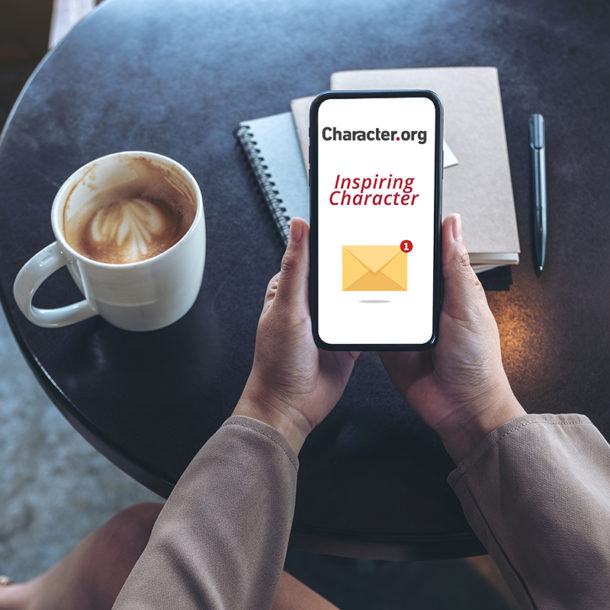By Dr. Arthur Schwartz
A few days ago, a friend sent me an article that included this 1965 quote by Martin Luther King, Jr.: “We must come to see that the end we seek is a world at peace with itself, a world that can live with its conscience.”
For some reason, I immediately fell into a giant rabbit hole. I couldn’t stop thinking about the word conscience. Do families use this term anymore? Or schools? Have we canceled the word? And if we have, has another term taken its place?
To find out, here’s my interview with this venerable yet contested term.
Arthur: Do you think you’ve been canceled?
Conscience: Yes, a bit. Okay, a lot.
Arthur: Why?
Conscience: It’s complicated. I’ve lived a long life.
Arthur: Then let’s start at the beginning. Where were you born?
Conscience: It was during the trial of Socrates. He told all of Athens that I was his constant companion, his “inner voice” that told him the right course to take.
Arthur: Sort of like a GPS?
Conscience: Yes. Most people think of their conscience as a warning system, for sure. But people also use their conscience to reflect on their behaviors and actions.
Arthur: So, where did you grow up?
Conscience: In the church. Augustine was the first to write that I was a divine voice. More to the point, conscience was the divine speaking within.
Arthur: When did people start using the term “guilty conscience”?
Conscience: Not until the 16th Century. The term was used to make the point that even when no one is looking, your conscience serves as that ever-vigilant witness to your choices. It was during this time when the word conscience was connected to sin, especially to sexual behavior.
Arthur: And then there is Sigmund Freud.
Conscience: Yes. Freud connected conscience to parental authority. He argued that a person’s conscience is that gnawing, ever-persistent voice of their parents. A voice that stays with each person far beyond childhood.
Arthur: Thank you for this brief tour. But let me ask again: Why do you think so many have canceled you?
Conscience. I understand why some people want to move on from a concept associated with a particular religion or a theory of child development that has lost its shine.
Arthur: But…
Conscience: (pause). Can you imagine living in a society where no one has an inner voice? Where families and schools don’t encourage children and teens to internalize universal principles that transcend any particular religion or culture?
Arthur: No, I can’t.
Conscience: Neither can I.
Arthur: So, what do you suggest?
Conscience: Thomas Green wrote a book in 1999 that is the right roadmap going forward. It’s titled Voices: The Educational Formation of Conscience.
Arthur: Why do you like it so much?
Conscience: First, I love his definition. He writes that conscience is our “reflexive judgment about things that matter.”
Arthur: I love that phrase…things that matter.
Conscience. I do, too. Green argues that there are many voices that form our conscience.
Arthur: Beyond religion or parents?
Conscience: Yes. He writes about the voice of craft — or what character educators today call performance character. This voice helps everyone, young and old, to live up to their own standards, whether doing their best to learn a sport or cleaning their room.
Arthur: What are the other voices?
Conscience: Green writes about the voice of membership. People learn about the virtues and universal principles by being a member of a family, a school, a team, a house of worship or a youth organization. At the heart of this voice are the relationships people form with others across the lifespan.
Arthur: This voice speaks to me. Years ago, there was a time when my kids were young, and I was having difficulty balancing my work life with being the best husband and father I could be. And then, one night, I got a phone call from a close friend who called to tell me — in no uncertain terms — that friendship is a two-way street (i.e., he was tired of always calling me). I still hear his voice in my head 25+ years later.
Conscience: Green also writes about the voice of sacrifice. At some point, every young person, perhaps as early as 12 or 13, will realize it’s not all about them. The voice of sacrifice helps kids to know when it’s time to turn off their social media because their mom needs them to babysit their younger sister. The voice of sacrifice is about young people establishing for themselves their own obligations and sense of duty.
Arthur: What is another voice?
Conscience: The voice of memory. For some people, it’s the voice of a particular story or narrative from their family’s past. For others, it’s an attachment to a moment they will never forget (a loved one passing away or the birth of a child). These inspiring memories are the sources and seedbeds that form a person’s conscience.
Arthur: Is that it?
Conscience: There’s one more voice. My favorite. The voice of imagination. Martin Luther King, Jr. would call this the prophetic voice. A conscience is formed by a person’s hopes for a better future. This voice often gives people their noble purpose.
Arthur: Okay, I see why you’re excited. But two more questions, if you have the time.
Conscience: I’m ready.
Arthur: The renowned biologist and neuroscientist Robert Sapolsky just came out with a new book saying we have no free will. Care to comment?
Conscience: Funny you asked about his book. Did you know that free will is my first cousin? We spoke yesterday. We think Sapolsky is wrong. People are not predetermined creatures. Their biology and environment do not wholly determine their choices. Every person has free will.
Arthur: I agree. Last question: Where do you see conscience 100 years from now?
Conscience. In a much better place. I envision a future where parents and educators have learned how to equip and empower young people to resist the pressures that tempt kids to discount or dismiss their conscience. A future where school leaders have put together a robust K-12 curriculum that invites students to creatively explore and examine the five different voices of conscience. Finally, society has figured out how to inspire people of all ages to make commitments that bind them to the voices of conscience that mean the most to them.
Arthur: So, you think you’re still around?
Conscience: Yes. More useful and helpful than ever before.







You have courage of conscience to raise this issue. Conscience would contain the discernment of right and wrong and define what is evil that you sought to address recently. There is no meaningful materialist theory of conscience so it does lead us back to recognizing a higher power, which creates other conflicts of interest for Character.org. I would at least make the point available that many people across many cultures and generations have found their faith has guided their conscience and it is the Judeo-Christian faith that has guided the development of a social conscience in Western Civilization.
This is a really helpful exploration of conscience on a lot of different levels. It provides a rare and informative historical perspective on the evolution of the concept. It also uses a delightful writing innovation (dramatic dialogue) as a structure. Most importantly it examines a number of core issues in the field (e.g., domains of character, moral motivation, current trends/future predictions, etc.). I would argue that this is another window into the long-standing multi-disciplinary connundrum of “Why be moral?” We often talk about a “moral compass.” The US Air Force Academy, where Arthur and I have both worked, uses the “north star” or “Polaris” as its metaphor, to the point of designing their character center building to point to Polaris including a direct view of it from the defendant’s seat in the honor courtroom. Ultimately, to be more moral there has to be an internal press/motivation to do what is right. This is why in our PRIMED model of character education, we so strongly emphasize the internalization of values through intrinsic motivation (and why we corresponding eschew extrinsic motivators such as rewards and public recognitions). The goal of character education should be for students to internalize and “become” the values that the school targets. Virtues after all are internalized values that manifest as enduring nexuses of cognition, emotion, motivation, and behavior. Conscience is another way of mapping that tricky developmental terrain.
I really enjoyed reading your imaginative interview with Conscience, incorporating historical references and diverse perspectives. Through this skillful dialogue, you helped me navigate these complex ideas with a blend of humor, creativity, and depth, making it an enjoyable and thought-provoking read. Very creative and informative!